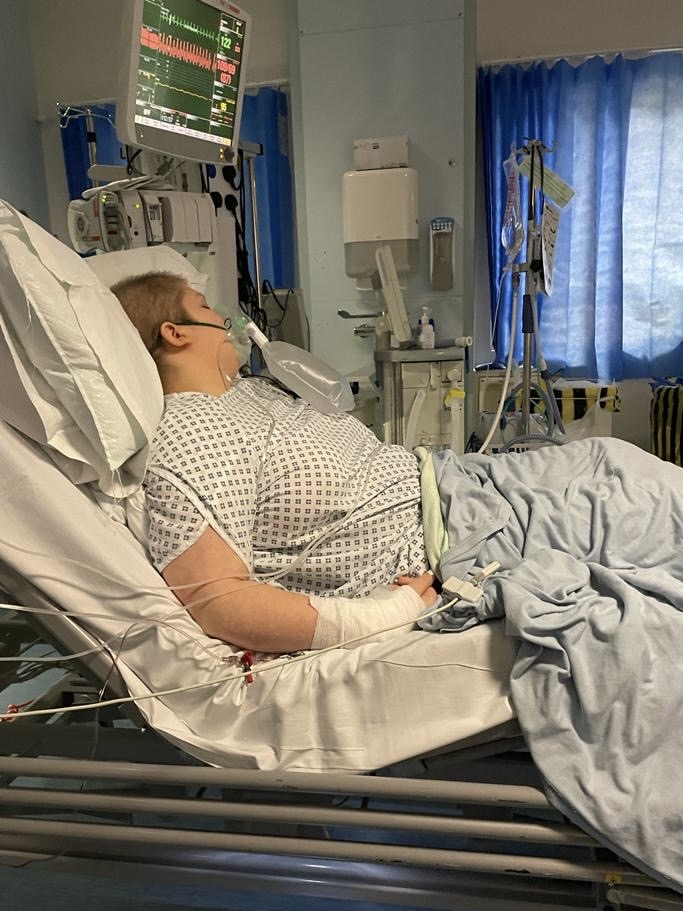Is there such a thing as 'good' cancer?
Chloe was 20 when she was diagnosed with thyroid cancer. Charlene, a Teenage Cancer Trust Youth Support Coordinator, helped Chloe realise that it was OK to ask for support and introduced her to other young people in the same situation.
At first she was reassured. Treatment for thyroid cancer has a high success rate, often without the need for chemotherapy. It leads to many people hearing the words, “if you have to have any cancer, this is the best one to have.”
For Chloe, being told her cancer was “good” led to feelings of guilt around her experience of cancer, feeling like she was less worthy of care.
“Although it helped at the time,” Chloe said. “It didn’t help me in the long run because you get it in your head that you had it easy. You feel like a fraud.”
Chloe had two operations to remove the left and right lobes of her thyroid gland in 2019. After the first, she struggled to walk, needing to have blood drained from her neck.
Teenage Cancer Trust Youth Support Coordinator Charlene first met Chloe after she had completed surgery.
“Chloe was a very shy young lady,” she said. “She felt like she didn’t deserve any help and support. I picked up on that straight away.
“I remember her saying, ‘oh, it’s okay because I’ve got a good cancer!’ and I thought, ‘hang on, we need to unpick that.’
You get it in your head that you had it easy. You feel like a fraud.
Chloe is not the only young person Charlene has noticed with this experience.
“I’ve had that feeling with every young person with thyroid cancer,” she said. “It’s a really complex area. We’ve had a young person who is suffering from PTSD. She doesn’t want to go out and feels really self-conscious about the scar on her neck, but a lot of people say after treatment’s over, ‘well, you’re alright now. You’re cured!’”
Even though thyroid cancer can be straightforward to treat, complications can still emerge. Chloe has had long-term effects from her cancer and the treatment.
“I had my thyroid removed,” she said. “I am always tired and that will be it for life now. I’ve always been curvy, but it also made me put on weight which has affected my confidence.”
Charlene’s support for Chloe included taking her to events like Look Good Feel Better and Find Your Sense of Tumour, which help connect young people with cancer.
Charlene remembers Chloe felt like an imposter at the events because she never had chemotherapy and didn’t lose her hair. “Chloe said, ‘But I’m not wearing a wig and everyone else here is.’ I had to explain that there was more to it,” she said. “In terms of her skin, her make up, the way she looked and her confidence.”
“Charlene enabled me to get my head around the fact that there isn’t a good or a bad type of cancer and that all types of cancers can have a negative impact on your life,” said Chloe. “She allowed me to accept that we all have the right for support.”
Charlene adds: “Young people have so much going on in their lives because they could have wanted to go to university or go travelling or go to festivals, but are instead sitting in a doctor’s office being told they have cancer. That’s very conflicting if they then hear their diagnosis is ‘good’.
“There needs to be education about what a diagnosis means for a young person and how they might process that without feeling guilty about receiving support from the services they’re entitled to.”
___
Whatever type of cancer you’re going through, your experience is equally valid and you deserve support. Please do speak to your clinical team, Teenage Cancer Trust Nurse or Youth Support Coordinator, and they’ll do whatever they can to help you.

